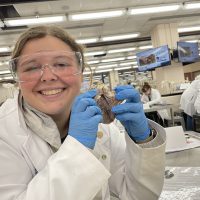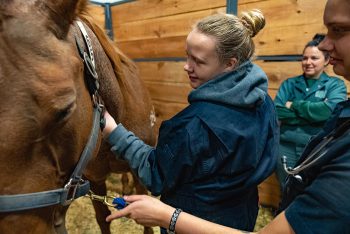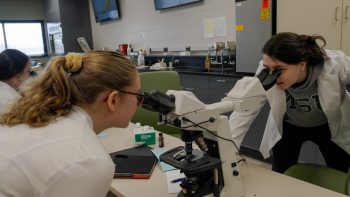Katlyn Cunningham is a first-year veterinary nursing student and Quinn Steffy is a 2024 graduating veterinary nursing student. These two students from the beginning and end of their veterinary nursing educations at MSU respectively offer their perspectives on what it takes to learn veterinary nursing at MSU.


How did you decide to pursue veterinary nursing?
K: I’ve shown livestock since I was ten years old! In 2021, a local veterinary clinic purchased one of my lambs at the fair. While chatting with the veterinarian we talked about my future plans, and at the time, I was still undecided but was open to exploring. He invited me to his vet clinic to shadow for a day to see what veterinary medicine was about. I met the amazing veterinary nurse, Sandy, who took me under her wing for the day and filled my head with so much new knowledge about the field. I grew a liking to this aspect of veterinary medicine and kept coming back to shadow more and more. Sandy graduated from the MSU Veterinary Nursing Program, so she is the reason I learned about the program and why I decided this was the career for me. I likely would be in a completely different career had that doctor not purchased my lamb that year, which is crazy to think about!
Q: I started out studying criminal justice, but I began to realize it wasn’t for me. At the same time, I was working at a veterinary clinic. Working at another practice is where I fell in love with the medical side of veterinary work, and I heavily considered becoming a veterinarian. I transferred to MSU and switched my major to animal science, but as I explored veterinary medicine, I realized that veterinary nursing was everything I wanted out of a job!
What’s one thing that was unexpected about studying veterinary nursing?
K: Something that was unexpected to me about this program was the support system. I knew going in that the faculty and peers were supportive, but I was not prepared for just how supportive they are. It blew my expectations out of the water. Everyone here in this program truly wants you to succeed and be the best nurse you can be and it's evident every single day. I remember doing my first successful blood draw and watching Kristi, one of our instructors, punch the air and cheer after I completed a jugular vein draw. These people are truly here for you and want you to be great.
Q: Moving from criminal justice to veterinary nursing meant switching from a less-sciencey background into a science-heavy field, so that was a big transition. Aside from that, something that surprised me was how much veterinary nurses can do! You don’t just have to work in a small animal clinical practice; so many doors open when you get a veterinary nursing degree. Personally, because of my criminal justice background, I’m thinking about pursuing animal forensics.
What has been your favorite part so far?

K: My favorite part about veterinary nursing so far is the hands-on experiences. I’m a hands-on learner, so I have really enjoyed learning something in class and then heading into lab later that week and practicing what we talked about. Because I grew up around livestock, another favorite thing of mine here is the large animal department! As students, we have access to the veterinary hospital. I spend a lot of my free time between classes walking through the large animal department to visit the teaching horses and goats and to just observe what is going on. I’ve been able to watch a few super interesting equine surgeries and a few cow procedures as well!
Q: Learning by doing has been a big favorite of mine. I work in emergency and critical care at the Veterinary Medical Center outside of class, so getting to learn something in class and then seeing it applied at work or vice versa is great. The labs are also cool and so much of the faculty here have VTS (veterinary technician specialist) degrees so they can provide us with unique perspectives.
What advice would you give to someone who wants to study veterinary nursing?
K: Do not memorize and regurgitate. Things you learn in your first semester WILL reappear in future classes and honestly, for the rest of your career. Know the basics and build off them. Put in the work to burn it in your brain so you don’t have to constantly Google to remind yourself of the information like the blood pathway through the heart, or what type of drug lidocaine is. It will make the classes in the future just a little less stressful.
Q: Find experience! And research different jobs a veterinary nurse can do. I like to go on Indeed and see what new jobs are open to veterinary nurses, which gives me a good perspective on my future career. Meeting people, making connections and learning are also all important parts of working in clinics so if you can build those skills early, it helps!
How can someone best prepare to be a veterinary nursing student?
K: I would say someone can best prepare to become a veterinary nursing student by getting those shadowing hours in and making the most of them. See everything you can see. Learn everything you can learn. I noticed I was more engaged in a lecture if I was familiar with it or had learned/seen the skill before. For example, learning how to do a physical exam. I had seen the doctor do it so many times, I already had an idea of how I wanted to do my physical exams when we began that topic.
Q: Again, definitely getting clinic experience, if you can. Having a good knowledge base on anatomy is helpful too. But if you’re nervous about the science part of classwork, don’t worry, the professors work really hard to portion out the information and help you along.
Do you need to grow up with animals or have a background working with animals to become a veterinary nurse?

K: Oh my goodness, absolutely not! Everyone here wants you to succeed. If you have no experience with animals or livestock besides your shadowing hours, that is completely fine. In your live animal labs, it is completely okay to work your way up to doing things that make you uncomfortable. The faculty are here to push you to be your best, while not pushing you over the edge. There is a great amount of my peers that only had shadowing hours and no other experience and are doing amazing in classes! It really helps that faculty break things down enough to where someone that has never done something before, like giving a vaccine or trimming toenails, knows exactly what to do start to finish. For bigger skills, like drawing blood, a faculty member will always be there to observe and coach you through it, so that was a big relief to me; it made me feel a little less scared and nervous. Everything you need to know to become a veterinary nurse, you will learn in this program and everything you need to learn how to do, you will learn in this program AND perform it in a lab or during clinicals.
Q: Not at all! I don’t come from an animal background or even a family that liked animals growing up. We had a dog and that’s about it. When I started veterinary nursing, my mom was like, “You know you’ll have to work with cows too, right?” and I said “I know! That’s what I’m excited about!” Getting experience before heading into the program helped me a lot, but I know lots of people who hadn’t worked in a clinic before applying. Keep an open mind and the program will teach you everything you need to know.
Anything else you would like to highlight?
Q: Veterinary nursing is a very young field compared to some other careers. The role of a veterinary nurse or LVT is not standard across all US states so that can complicate the job, but it also means the field is constantly evolving and there are so many interesting places and roles you could end up in as a veterinary nurse!
K: Go Green!
